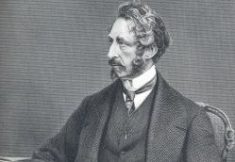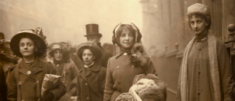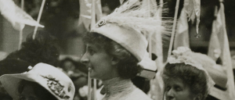Edward Bulwer Lytton of Knebworth House stood as candidate for Hertfordshire at the 1858 election. Although he was unopposed, it was not the quiet election he may have anticipated.

Edward Bulwer Lytton
Lytton was married to Rosina Doyle Wheeler in 1827. The marriage produced a daughter, Emily, who died aged 19 in 1848, and a son, Edward Robert Bulwer Lytton (1831 – 1891) who became Earl Lytton and Viceroy of India. The Lyttons parted in 1833. This was formalised in 1836 but it was a very bitter separation. Although it was her husband who was the well-known novelist, Rosina also published, including a novel, Cheveley, or the Man of Honour in 1839, which exposed her husband’s hypocrisy. A long running grievance was her request for an increase in her allowance and the cessation of the surveillance he put on her.
On news of the forthcoming hustings in 1858 she left Taunton, where she had been staying for some years, and came to Hertford to arrange for the distribution of handbills:
Lady Bulwer Lytton urgently solicits the attendance of the yeomen and Electors of Hertfordshire in the town hall of Hertford on Tuesday the 8th of June at 12 o’clock at noon not indeed to solicit their votes but for their true interest.
Having disrupted the meeting, Lady Lytton returned to Taunton. Sir Edward was elected and appointed as Secretary for the Colonies. He retaliated by seeking medical support that she must be insane and Lady Lytton was put under the protection of a doctor. However, Lady Lytton had friends and the Somerset County Gazette took up her cause, asking how someone who was perfectly sane could be made an inmate of a lunatic asylum. She was swiftly released.
The story was taken up by other publications and whilst the Hertford Mercury was conscious of a need for local loyalty to Lord Lytton, it felt it needed to acknowledge that this was an important news story and reported it in its 17 July 1858 issue. The editorial acknowledged a reluctance to intrude on private feuds and sorrows, but, the private life of Sir Edward Bulwer Lytton had assumed a public aspect with his appointment to the Cabinet and appointment of Secretary for the Colonies and his position to make decisions affecting the people of England and overseas, consequently there were matters:-
“of such painful notoriety, that it would not only be useless, but a flagrant abandonment of public duty, to avoid reference to them“. The editorial also noted that it was incredible that “the honoured representative of an English county, a Cabinet Minister, has been found guilty of this foul and grievous outrage”. The columns of the paper were open to Sir Edward to defend himself.
A letter was published in the 7 August edition from “A Foe to Oppression” asking whether or not Lady Lytton’s incarceration was a blow struck by her husband “to induce her to yield in the conflict which they have so long and obstinately waged against one another”. Clearly there had been some criticism of the Hertford Mercury in running the story and the Editorial in the same edition sought to justify the its previous reporting.
“Hertfordshire demanded to know something about a matter in which it was so nearly interested and about which all England was talking“.
Although the matter had become national news, the Times restricted itself to one statement on 14 July 1858:
“Lady Bulwer Lytton – We are requested to state, upon the best authority, that all matters in reference to this lady, about whom certain statements have appeared in some public journals, are in the process of being amicably settled by family arrangements to the satisfaction of all parties concerned.”
A letter from their son, Robert Bulwer Lytton, (pictured here in his robes as Viceroy of India) appeared in the Times on 19 July to the effect that he and his mother were to travel abroad.
There are a few letters from Lady Lytton at HALS (D/Z123/1-14 – Acc4431) which give her perspective. Writing on 11 September 1859 from Taunton to A E Chalon Esq:
I am sure you would laugh at the pompous, indeed, the ridiculous appeals to my honor, (sic) not to endanger the peace of the family by exposing him!! The only idea of dignity the said Bulwer Lyttons have being pomposity and their only idea of honor concealment of infamy.
She referred to Lord Derby and the disgraceful appointment of such a Colonial Secretary. She also commended the Daily Telegraph – who fought my battle nobly – and indeed most of the press with the exception of that beastly venal time serving “Times” out of which any truth can be kept out and into which any lie can be got.
Edward Bulwer Lytton was Colonial Secretary for just one year. He was raised to the peerage in 1866 and died in 1873. Rosina Bulwer Lytton published her memoirs, A Blighted Life, in 1880. She died in 1882.
Their granddaughter, Lady Constance Bulwer Lytton, was a suffragette. More information about her can be found here

Constance awaiting sentencing on the far right of the photo in 1912 .

Lady Constance Lytton, Suffragette.






Add your comment about this page